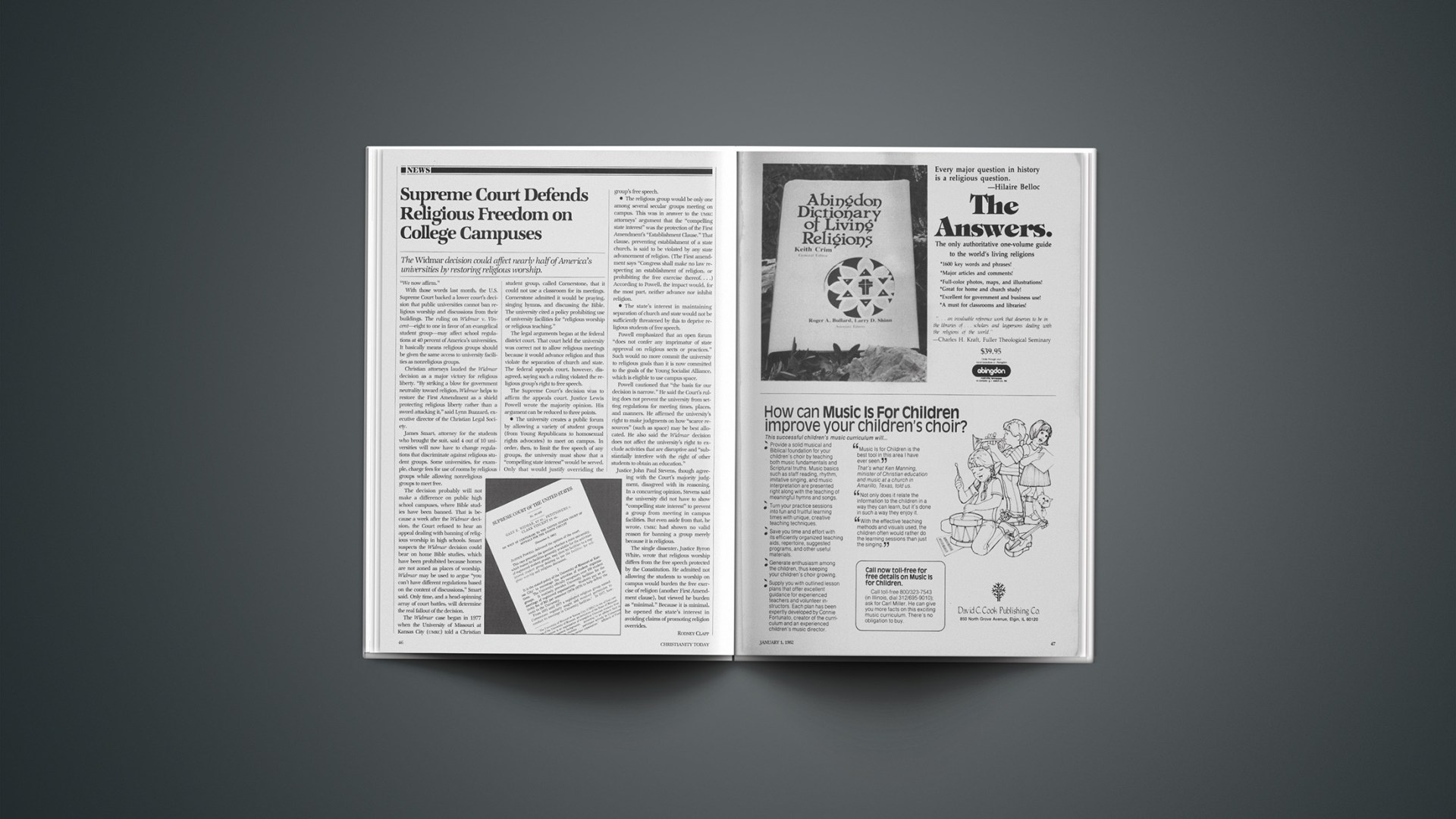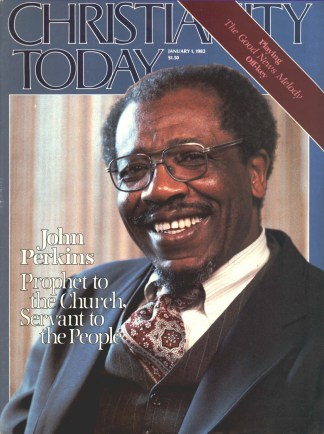“We now affirm.”
With those words last month, the U.S. Supreme Court backed a lower court’s decision that public universities cannot ban religious worship and discussions from their buildings. The ruling on Widmar v. Vincent—eight to one in favor of an evangelical student group—may affect school regulations at 40 percent of America’s universities. It basically means religious groups should be given the same access to university facilities as nonreligious groups.
Christian attorneys lauded the Widmar decision as a major victory for religious liberty. “By striking a blow for government neutrality toward religion, Widmar helps to restore the First Amendment as a shield protecting religious liberty rather than a sword attacking it,” said Lynn Buzzard, executive director of the Christian Legal Society.
James Smart, attorney for the students who brought the suit, said 4 out of 10 universities will now have to change regulations that discriminate against religious student groups. Some universities, for example, charge fees for use of rooms by religious groups while allowing nonreligious groups to meet free.
The decision probably will not make a difference on public high school campuses, where Bible studies have been banned. That is because a week after the Widmar decision, the Court refused to hear an appeal dealing with banning of religious worship in high schools. Smart suspects the Widmar decision could bear on home Bible studies, which have been prohibited because homes are not zoned as places of worship. Widmar may be used to argue “you can’t have different regulations based on the content of discussions,” Smart said. Only time, and a head-spinning array of court battles, will determine the real fallout of the decision.
The Widmar case began in 1977 when the University of Missouri at Kansas City (UMKC) told a Christian student group, called Cornerstone, that it could not use a classroom for its meetings. Cornerstone admitted it would be praying, singing hymns, and discussing the Bible. The university cited a policy prohibiting use of university facilities for “religious worship or religious teaching.”
The legal arguments began at the federal district court. That court held the university was correct not to allow religious meetings because it would advance religion and thus violate the separation of church and state. The federal appeals court, however, disagreed, saying such a ruling violated the religious group’s right to free speech.
The Supreme Court’s decision was to affirm the appeals court. Justice Lewis Powell wrote the majority opinion. His argument can be reduced to three points.
• The university creates a public forum by allowing a variety of student groups (from Young Republicans to homosexual rights advocates) to meet on campus. In order, then, to limit the free speech of any groups, the university must show that a “compelling state interest” would be served. Only that would justify overriding the group’s free speech.
• The religious group would be only one among several secular groups meeting on campus. This was in answer to the UMKC attorneys’ argument that the “compelling state interest” was the protection of the First Amendment’s “Establishment Clause.” That clause, preventing establishment of a state church, is said to be violated by any state advancement of religion. (The First amendment says “Congress shall make no law respecting an establishment of religion, or prohibiting the free exercise thereof.…) According to Powell, the impact would, for the most part, neither advance nor inhibit religion.
• The state’s interest in maintaining separation of church and state would not be sufficiently threatened by this to deprive religious students of free speech.
Powell emphasized that an open forum “does not confer any imprimatur of state approval on religious sects or practices.” Such would no more commit the university to religious goals than it is now committed to the goals of the Young Socialist Alliance, which is eligible to use campus space.
Powell cautioned that “the basis for our decision is narrow.” He said the Court’s ruling does not prevent the university from setting regulations for meeting times, places, and manners. He affirmed the university’s right to make judgments on how “scarce resources” (such as space) may be best allocated. He also said the Widmar decision does not affect the university’s right to exclude activities that are disruptive and “substantially interfere with the right of other students to obtain an education.”
Justice John Paul Stevens, though agreeing with the Court’s majority judgment, disagreed with its reasoning. In a concurring opinion, Stevens said the university did not have to show “compelling state interest” to prevent a group from meeting in campus facilities. But even aside from that, he wrote, UMKC had shown no valid reason for banning a group merely because it is religious.
The single dissenter, Justice Byron White, wrote that religious worship differs from the free speech protected by the Constitution. He admitted not allowing the students to worship on campus would burden the free exercise of religion (another First Amendment clause), but viewed he burden as “minimal.” Because it is minimal, he opened the state’s interest in avoiding claims of promoting religion overrides.
Westminster Seminary Fires Theologian
Norman Shepherd has been dismissed as associate professor of systematic theology at Westminster Theological Seminary, Philadelphia, ending a long dispute over his view of the doctrine of justification.
In dismissing Shepherd, the seminary board of trustees said it “makes no judgment whether Mr. Shepherd’s views as such contradict or contravene any element in the system of doctrine taught by the Westminster Standards.”
The board decided that because of the long debate, too many people in the seminary community have come to believe Shepherd holds views contrary to Reformed doctrine. The dismissal, then, was in the best interests of the seminary,” the board said.
In a theological paper submitted to the board, Shepherd acknowledged that some of his teachings might lead one to believe that justification is conditioned on the believer’s subsequent good works. In the paper he quoted an earlier statement of his, in which he said, “Works done from true faith … being the new obedience wrought by the Holy Spirit in the life of the believer united to Christ … are necessary for salvation from eternal condemnation.…”
Yet he also said, “I wholeheartedly repudiate the inference that man, by his works, contributes to his own justification.” Shepherd said he fashioned his system to guard against the erroneous beliefs that one can enjoy forgiveness of sin without repentance, or that one can enter eternal life without attaining the holiness specified in the Scripture (Heb. 12:14), or that salvation absolves one from the necessity to persevere in the faith.
In his own paper submitted to the board, Edmund Clowney, the seminary’s president, explained his doubts about Shepherd’s views. First, he credited Shepherd as a first-rate scholar widely read in the Reformation authors. Clowney said Shepherd is one of the seminary’s highly regarded professors. But, said Clowney, “After examining his position as carefully as I can, I am persuaded that his views are sufficiently distinctive in emphasis and form to be controversial.”
Clowney told the board in his paper that the “firestorm of criticism” against Shepherd was eroding the seminary’s reputation among the churches from which the school draws support and students.
Shepherd joined the Westminster faculty in 1963. His dismissal is effective in January, and he will continue to draw full salary until June 1983.










